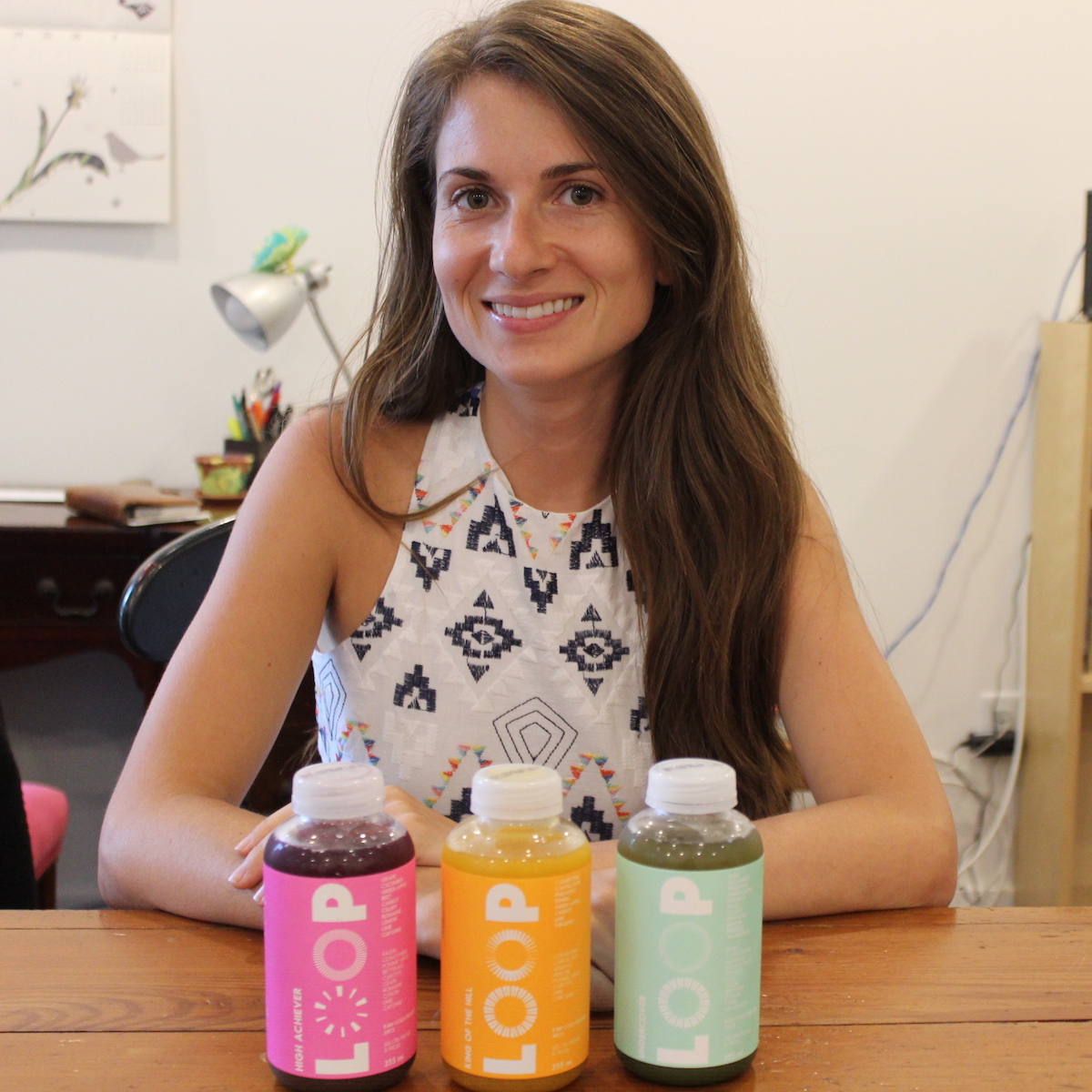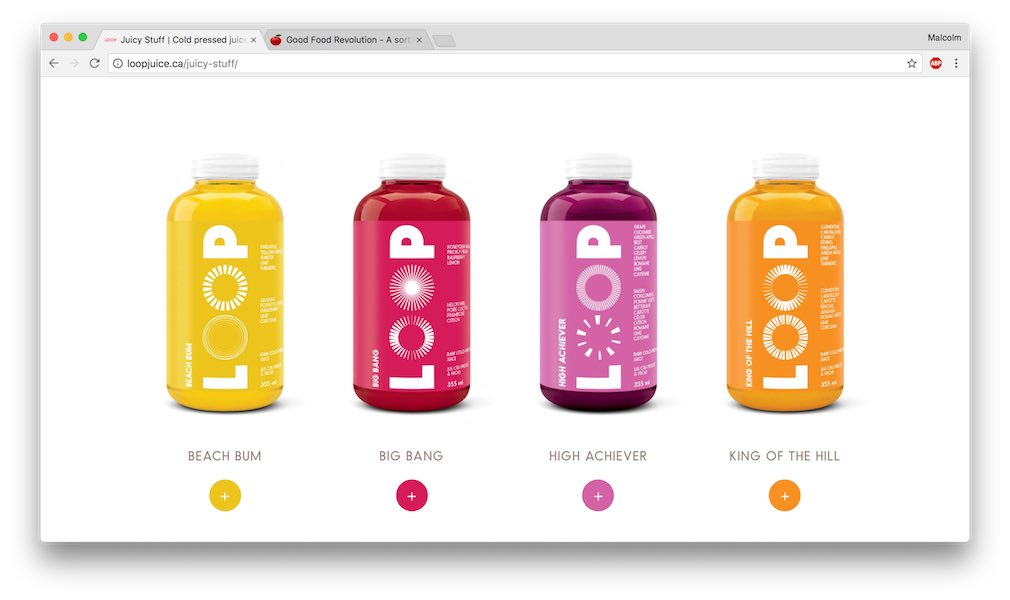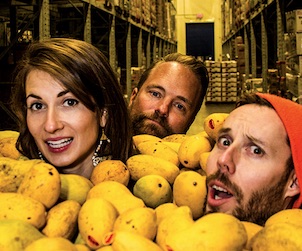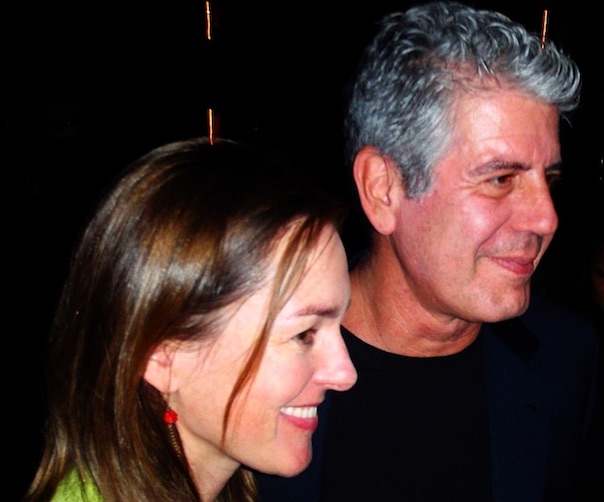Malcolm Jolley talks to LOOP Juice co-founder and president Julie Poitras-Saulnier.

Julie Poitras-Saulnier is a co-founder and President of LOOP Juice.
Just a couple of years ago Julie Poitras-Saulnier was a sustainable food expert and executive looking for a new project with fellow Montrealer David Côté. Côté was (is) a successful restaurateur and natural foods entrepreneur who, at the same time, had caught the attention of Frédéric Monette, whose family fresh fruits and vegetables to Côté’s businesses. Monette wondered if Côté could help solve the problem of food waste, and Côté and Poitras-Saulnier saw the opportunity that is LOOP Juice. By Januaury 2016 the three became co-founders of the company that Poitras-Saulnier serves as President and LOOP Juices began to take Montreal, and then Quebec by storm.
I met Julie Poitras-Saulnier in Toronto last week as she launched the brand in Ontario and agreed to fit in an interview in between sales calls. Our conversation is reproduced below.
This interview has been edited for length, clarity and style.
Good Food Revolution: Is it true that you make juice from garbage?
Julie Poitras-Sauliner: [Laughs.] Yes and no. We partner with Courchesne Larose, which is a major fruits and vegetable distributor. They throw away 16 tons of fruits and vegetables per day.
Good Food Revolution: Wow.
Julie Poitras-Saulnier: Yeah, it’s huge. But they’re not worse than any other distributor in the market. It’s just the way the market is. It’s not because the fruits and vegetables are bad, it’s that if they aren’t sold in one week, they don’t have enough shelf life to be distributed the next week. The sales cycle takes two to three weeks from the time that the fruits and vegetables are sent to the distribution centre. If they’re sent to the stores, the stores want them to be able to stay on the shelves for a least a week. And if consumers buy them, they want the fruits and vegetables to last for another week. So, it’s not really garbage. We use produce that’s going to be ripe in three or four days. This is produce that is perfect, but it’s still rejected from the distribution cycle.
Good Food Revolution: How did you and your partners know about this? Where did you get the idea to make LOOP Juice?
Julie Poitras-Saulnier: It really started with Courchesne Larose. They contacted David and me. David [Côté] was already known in Quebec for Crudessence, a raw food restaurant chain he started and RISE Kombucha, which is available all over Canada. I have a background in sustainability and food, and David and I were looking for an impactful project, a purpose driven business. At the same time Frédéric Monnette from Courchesne Larose contacted us with their produce problem and we thought, OK this is perfect. To complete the story, we decided that our own waste, from making juice, has to be an ingredient for another company, so that there is no concept of waste in our business. So we use the leftovers from Courchesne Larose for our business, and the leftovers from us, which is the residual pulp and fibres, goes to a company that makes dog treats. That’s the “LOOP”. The idea of using everything.
 Good Food Revolution: What about this process of cold press? I know about it in the context of olive oil, but I haven’t heard about cold press in terms of juice.
Good Food Revolution: What about this process of cold press? I know about it in the context of olive oil, but I haven’t heard about cold press in terms of juice.
Julie Poitras-Saulnier: We don’t pasteurize our juice, so that we keep all the integrity of the nutrients: the enzymes and vitamins. It’s a way to keep a lot of phyto-nutrients. We put 1.5 kilos of fruits and vegetables in every bottle. We remove the fibre, which means we can use more fruits and vegetables, it’s super intense.
Good Food Revolution: But how does this relate to what you call ‘pascalization’? What’s the process?
Julie Poitras-Saulnier: It’s also called HPP, or high pressure processing. After the juice is in the bottle, once it’s been capped and everything, it’s put in a chamber that puts water pressure on it. The water is at two degrees, so it’s cold. The bacteria in the bottle implodes; it reduces the ppm of bacteria so the juice will last longer. It’s like if you put the bottle deep under the ocean, and then removed it very quickly.
Good Food Revolution: That’s amazing. How did you find out about that?
Julie Poitras-Saulnier: It’s a process that’s been used in Canada for about two or three years. And we were aware of it because it’s really a food revolution. It changes the way we can eat because unlike pasteurization, it keeps the nutrients.
Good Food Revolution: So you are just now coming into the Ontario market, but when I went to your French language website, jusLOOP.ca, I saw that your juice is all over Quebec. You have been very successful very quickly. Is Toronto your first market outside of Quebec?
Julie Poitras-Saulnier: Oui! We find that people here are really aware of cold pressed juices*, and we see lots of companies doing cold pressed juices. But it’s so expensive! We see $10 to $12 for a juice. At LOOP we have two missions: our first mission is to reduce food waste and our second mission is to make these healthy juices more accessible. We are consumers of these types of products and for us it just didn’t make sense for them to be so expensive. One of the reasons we started LOOP was that we could pay a lot less for our fruits and vegetables, so we can really reduce the price. Our juice retails at $4.95 for a 12 ounce or 355 ml bottle. That’s the lowest price over all in the market.
Good Food Revolution: And you not just selling plain old orange juice. The juices are blends of many fruits and vegetables, right?
Julie Poitras-Saulnier: Yeah, we wanted to make them really more healthy. It’s always a mix of fruits and veggies, never just fruit so there isn’t too much sugar. We try for a balance. But also, we developed the recipes based on what we have available. We looked a the historical data form Courchesne Larose to see what they waste every year because, as crazy as it sounds, they know over a year how much they are going to throw away.
Good Food Revolution: They just don’t know every week?
Julie Poitras-Saulnier: Right. So we looked at what waste they had and what produce was available all year long. Sometimes they have a huge a mount of peaches, but only for three months a year. So in a way we didn’t really choose what is in the juices.
Good Food Revolution: I guess if you’re Courchesne Larose, and you have that much produce you have to throw away, it’s a problem. Like, it must cost money to waste that much food.
Julie Poitras-Saulnier: Absolutely. It costs millions in terms of the value of the produce, but also it costs hundreds of thousands of dollars for them to send it to the landfill. Now, because Courchesne Larose owns part of our business, they are transforming that loss into a profit.
Good Food Revolution: In some ways this sounds like such a simple idea.
Julie Poitras-Saulnier: I know. Everybody says they don’t understand why we are the first ones to do this. I don’t know why. It’s so logical because everybody wins: consumers win because we can charge less for better juice, the planet wins because less produce is sent to the landfill so there’s less greenhouse emissions, we win because our produce costs less we can tell our story for our marketing, Courchesne Larose wins because they throw away less… It’s really win-win for everybody.
* * *
N.B. I tasted three flavours of LOOP Juices quickly with Poitras-Saulnier, and then more seriously with my eight year old son, Hamish. I agree with Poitras-Saulnier: the juice is intense with flavour, but not too sweet. Interestingly, Hamish’s favourite was a beet-based one, sweetened with grape juice, among other things. If they can my kid to consume beets, then it’s no wonder they seem to be meeting with success.
*With the obvious exception of some clueless food journalists!








There’s a company of the same name in Chicago (different logo) doing the same thing. Are they associated? Isn’t the sugar content rather high – 22 grams per small bottle?
As far as I know they are completely different companies. The Chicago one was founded many years before, and I presume they are named after the downtown neighbourhood there. If the Chicago Loop didn’t register their trademark in Canada, the Montreal Loop would be free to use the name as long as they didn’t try south of the border (I think). And I don’t know about juice sugar (just wine), but I imagine juice is pretty sweet, full of fructose?